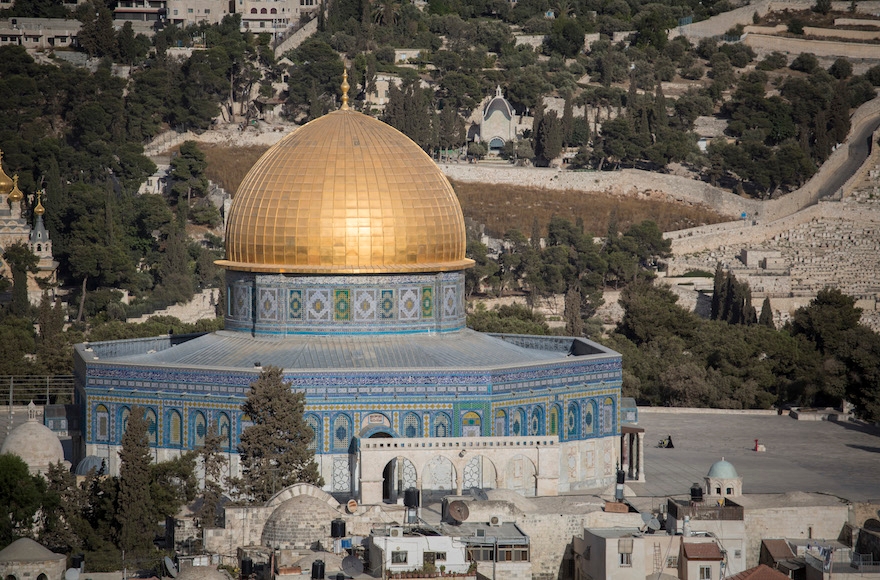(JTA) – Israeli Education Minister Naftali Bennett said Israel would suspend its cooperation with UNESCO because of the U.N. agency’s decision to ignore Jewish ties to holy sites in Jerusalem.
Bennett’s statement on Friday followed passionate condemnations by Israel as well as international Jewish groups and communities of a vote the previous day in Paris by the executive board of the United Nations Educational, Scientific and Cultural Organization.
Through a majority of 24 to 6 votes, the board passed a preliminary version of a resolution that calls several sites holy to Judaism only by their Islamic names without mentioning its Jewish names in Hebrew or English. The sites include the Temple Mount, referred to as Al-Ḥaram Al-Sharif.
Israeli officials will neither meet UNESCO representatives nor engage in cooperation in international conferences or professional cooperation with the organization, Bennett said in a statement that followed the outpouring of condemnations – including by a U.S. official who called the vote “one-sided and unhelpful.”
Republican presidential nominee Donald Trump called the move by UNESCO a “one-sided attempt to ignore Israel’s 3,000-year bond to its capital city” and “further evidence of the enormous anti-Israel bias” at the United Nations.
Democratic nominee Hillary Clinton’s foreign policy adviser, Laura Rosenberer, condemned the resolution.
“It’s outrageous that UNESCO would deny the deep, historic connection between Judaism and the Temple Mount,” she said.
Irina Bokova, UNESCO’s director-general, on Friday issued a statement that was deemed critical of the vote. “To deny, conceal or erase any of the Jewish, Christian or Muslim traditions undermines the integrity of the site, and runs counter to the reasons that justified its inscription on the UNESCO World Heritage list,” she said. “When these divisions carry over into UNESCO, an organization dedicated to dialogue and peace, they prevent us from carrying out our mission.”
Bennett in his statement said of the UNESCO countries, “Your decision denies history and encourages terror. Those who give prizes to the supporters of Jihad in Jerusalem the same week that two Jews are murdered in the city could God forbid encourage more victims.”
The United States, the United Kingdom, Germany, the Netherlands, Lithuania and Estonia voted against the resolution and 26 countries abstained. Israel’s ambassador to UNESCO called the voting an improvement to previous votes by the U.N. agency, saying Western countries had supported previous measures with similar language on Jerusalem. Russia and China were among those that backed the resolution.
“This vote was certainly unpleasant, but I’m very pleased with the result,” Ambassador Carmel Shama-Hacohen told Army Radio Friday morning. “Our goal was to bring back France and our friends in Europe to not support the Palestinian resolution.”
He noted that Sweden, whose government is a harsh critic of Israel and the only EU Cabinet member that recognizes the Palestinian Authority as a state, also sat out the vote, as did India, which historically has supported anti-Israel resolutions in U.N. forums.
France and Sweden both abstained from Thursday’s vote after supporting a UNESCO resolution in April that also ignored the site’s Jewish ties. The April vote saw 33 votes in favor, 6 against and 17 abstentions.
Classified as pertaining to “Occupied Palestine,” the UNESCO resolution passed Thursday was submitted by Algeria, Egypt, Lebanon, Morocco, Oman, Qatar and Sudan. While it affirms “the importance of the Old City of Jerusalem and its Walls for the three monotheistic religions,” it contains two references to Judaism: One in describing holy sites in Hebron and the other in decrying “the enforced creation of a new Jewish prayer platform south of the Mughrabi Ascent in Al-Buraq Plaza.”
The so-called al-Buraq Plaza is better known as the Western Wall Plaza – possibly Judaism’s holiest site. The use of the Arabic-language name is a recent development lifted from Hamas literature, according to the Simon Wiesenthal Center.
JTA has documented Jewish history in real-time for over a century. Keep our journalism strong by joining us in supporting independent, award-winning reporting.






